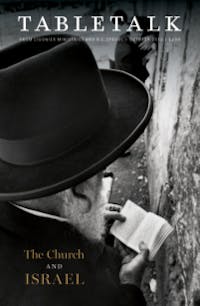
Request your free, three-month trial to Tabletalk magazine. You’ll receive the print issue monthly and gain immediate digital access to decades of archives. This trial is risk-free. No credit card required.
Try Tabletalk NowAlready receive Tabletalk magazine every month?
Verify your email address to gain unlimited access.
I am deeply grateful to my Old Testament professor. Though I was young and foolish while in seminary, I have, by God’s grace, been growing less young and less foolish over time. I used to argue with him about as often as I now look back with thanks in my heart. He not only taught me how to understand the Old Testament, but at the same time how to understand the Bible. He taught me that the Bible is one book.
There are two key elements I learned from him that touch directly on the issue of the relationship of Israel and the church. First, he taught that if we want to understand what a text means to us, we first have to understand what the text must have meant to its original audience. The second element could be understood as a corollary to the first—never assume the Bible practices mortar-shell prophecy. This is the notion that God sends a prophet to a particular people, equipped with a particular message. When that message is given, however, it has no meaning to the original audience, but like a mortar shell crossing high above a battlefield to eventually land on the enemy, the prophecy only takes on meaning hundreds or even thousands of years after it is given.
When Jesus said we should seek first the kingdom of God, for instance, to whom was He speaking? When He zeroed in on the fears and weaknesses of those in His audience, those who worried about what they would wear or what they would eat, was He actually talking to an unnamed group in the future? Is the whole of the Sermon on the Mount a sermon for faithful Jews in attendance, for Christians living in the interim between Jesus’ two advents, for both, or for neither? If it was for both, was it for both together or both separately?
To ask the question in terms of what the original audience must have heard is to answer the question. No one would have thought: “Well, this is all well and good for later. Jesus is talking about the church age, so when it starts, we will start to obey this command.” No one would have thought, “This is for now, but when the church age begins, we will cease from seeking the kingdom and His righteousness.” Certainly no one would have thought: “I will seek first His kingdom as a Jew until the church age begins. I will cease to pursue it during the church age. Then, I will pursue it again.” The kingdom they were called to pursue, the kingdom we are called to pursue, is not now, and never has been, a divided kingdom. It is that kingdom, that one kingdom, where Christ reigns. It is that kingdom, that one kingdom, we enter through His righteousness alone. It is that kingdom, that one kingdom, where all the needs of all God’s people are met by the one King.
When we seek to divide the kingdom, we will inevitably end up seeking to divide the King. He is the King, after all, who so perfectly identifies with His people. Remember that when our King confronted that murderer of God’s people named Saul, He demanded to know not why Saul was persecuting the citizens of the kingdom, but why Saul was persecuting Him. And when Saul was brought into that one kingdom as Paul, it was he who was changed, not the kingdom.
There is not now, nor was there ever, a kingdom on earth and a kingdom in heaven, because there is only one King. We do not wait for His kingdom. We do not wait for His inauguration. All authority in heaven and on earth has been given to Him (Matt. 28:18–20). Now He sits at the right hand of the Father (Rom. 8:34). Now He is bringing all things under subjection. Now He is conquering all His and our enemies (1 Cor. 15:20–28). This is not merely a future hope, but a present reality.
The good news is that our Lord reigns. This means that even when those over whom He rules try to divide themselves, try to draw sundry boundaries in the kingdom, they will always and everywhere fail. We cannot tear asunder what God has brought together. This also means, however, that even those with multiple kingdoms, multiple peoples, multiple epochs are His, just as I am. We are one, because we confess one Lord, because we proclaim one faith, because we enjoy one baptism, because we serve one kingdom, because we love one King (Eph. 4:4–6).
His kingdom is not extending its boundaries. Wherever there is a there, there He reigns. It is, however, becoming more visible, more manifest. The elect are being brought in. Knees in every nation are bowing. Tongues in every language are confessing. The Rock that was uncut by human hands, that destroyed the kingdoms of this world, is even now covering the earth as the waters cover the sea. This is the kingdom that we serve, the kingdom that has come, the kingdom that is forever. This is the one kingdom we all seek.
